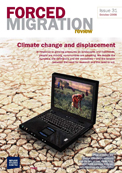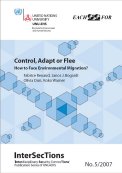Jane McAdam, Associate Professor, Faculty of Law, University of New South Wales, Australia; and Research Associate, Refugee Studies Centre, University of Oxford, published a paper that calls for a new international treaty for ‘climate refugees’ or ‘climate migrants’. Drawing in part on field work undertaken in Kiribati and Tuvalu, it examines some conceptual and pragmatic difficulties in attempting to construct a refugee-like instrument for people fleeing the effects of climate change, and critiques whether there are legal, as opposed to political, benefits to be gained by advocating for such an instrument.
“Human movement caused by environmental factors is not new. Natural and human-induced environmental disasters and slow-onset degradation have displaced people in the past, and will continue to do so in the future. Such movement is a normal part of adaptation to change. The ‘newness’ of displacement triggered (at least in part) by climate change is its underlying anthropogenic basis, the large number of people thought to be susceptible to it, and the relative speed with which climate change is to occur, which may hamper people’s traditional adaptive patterns that historically were able to develop over time. According to the United Nations High Commissioner for Refugees, it is becoming difficult to categorize displaced people because of the combined impacts of conflict, the environment and economic pressures. While the term ‘refugee’ describes only a narrow sub-class of the world’s forced migrants, it is often misapplied to those who move (or who are anticipated to move) for environmental or climate reasons. As explored below, this is not only erroneous as a matter of law, but is conceptually inaccurate as well. In contexts such as the so-called ‘sinking islands’ of Kiribati and Tuvalu in the South Pacific, movement is less likely to be in the nature of sudden flight, and more likely to be pre-emptive and planned. This does not mean it is not ‘forced’, but rather that top-down policy
responses and normative frameworks that predicate forced migration on a particular notion of exodus may not match up to realities of movement. Furthermore, while ‘development-induced displacement’ and ‘conflict-induced displacement’ describe primary motivations for movement in certain contexts, field research in Tuvalu and Kiribati highlights the difficulties of describing human movement from these States as exclusively ‘climate-induced displacement’…” To read more, go here.



